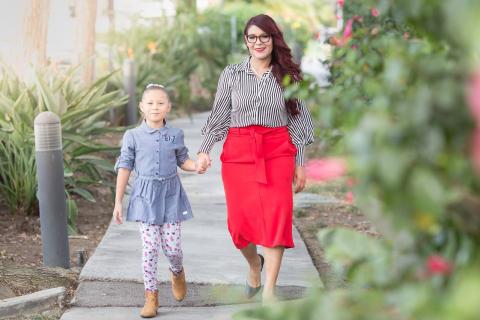
Today, the conversation around ensuring the wellbeing and safety of our children during these extraordinary times is as important as ever as Dia de las Madres (Mother’s Day) lands on the cusp of the 2020 Census and against the backdrop of the coronavirus
This Dia de las Madres (Mother's Day) Help us Secure our Children’s Future Through A Full Census Count
Every mom remembers the day she held her little one(s) for the first time – a moment of both great joy and some anxiety about what the future may bring. I became a mother (and father) to a beautiful baby girl – Rosita, in September of 2009. Like many moms, before I knew it, I found myself back at work by November of that year at NALEO Educational Fund. While I was still dealing with night feedings and a lack of sleep at home, I was gearing up at work for a major push to promote a full count of the Latino population in Census 2010. Navigating these efforts in my professional life amid being a new mother was hard work. And as our organization did not always have the time, staff, or resources needed to make sure every person in our community was counted, like being a new mother, we innovated and adapted as we marched on toward our goals.
During this time, I quickly began to appreciate that my role as a mom was not just to keep Rosita fed and clothed, but also to protect her future. While I couldn’t necessarily predict or control what time she would wake up at night or if she got sick, I could put forward a community-oriented effort to improve her surroundings by fortifying her future and the democracy she will come to participate in by making sure she was counted in Census 2010.
Even though Rosita was just a few months old, she was here, and I had the opportunity to elevate her a voice by making sure she was included on my home’s census form. Getting counted in the decennial census was a way to ensure that my daughter and the rest of our community were visible. This meant fair representation in Congress and the proper enforcement of key civil rights policies that affect underrepresented communities. It also meant ushering in a fair share of funding for health care systems, schools, and other vital programs our children need to live healthy lives.
As parents, these elements of public life are critical for our children's futures. Vital programs like Head Start; the Special Supplemental Program for Women, Infants, and Children (WIC); the Child Care and Development Block Grant; and the Maternal and Child Health Services Block Grant—distribute $20 billion annually to states and localities based, at least in part, on the census count of the population under age five.
Today, the conversation around ensuring the wellbeing and safety of our children during these extraordinary times is as important as ever as Dia de las Madres (Mother’s Day) lands on the cusp of the 2020 Census and against the backdrop of the coronavirus (COVID-19) public health crisis. As these circumstances exacerbate the existing risks of massively undercounting children – particularly Latino and other children of color, the need to ensure a full and accurate count has never been more paramount as it is today. While school districts take on new virtual learning scenarios and work to ensure that students still have access to food programs, we are even further reminded of the census’ impact on the vital programs that exist to help protect our children’s futures.
Latinos are the second-largest population group in the country and among the fastest-growing. Despite this reality, Latino children are among the most undercounted segments of our nation’s population. In Census 2010, over one million children under five were not counted – 400,000 were Latino. My colleagues and I at NALEO Educational Fund worked tirelessly to build strategic partnerships, develop informational materials, and generate earned media opportunities that would help address this undercount. Despite our efforts, a decade later, Latinos and communities of color remain among the hardest to count populations in our country.
Today, the census faces even more challenges than it did in 2010. Attempting to conduct a full count during a global pandemic alongside ongoing operational shifts that consider the safety of Census Bureau staff and the general public, is an unprecedented feat for the Census Bureau. Additionally, a lack of adequate funding for the Bureau, lingering confusion around the failed Citizenship Question, and anti-immigrant and anti-Latino sentiment, all accompanying a deep sense of mistrust and fear of government have put the upcoming decennial count at an even higher risk of failure.
These issues only exacerbate existing confusion around how, when, and where to fill out the form and who to count. This could result in not only less federal funding for education, healthcare, and transportation infrastructure programs, but it would also unfairly shape political representation for the next ten years.
The 2020 Census will be the first in American history where Latinos make up the nation’s second-largest population group. An undercount of the Latino population would ultimately mean a failed census for the entire country. This issue is deeply personal for me. That’s why when NALEO Educational Fund invited me to rejoin the team and work toward a full count of our community in the upcoming decennial census, I accepted the challenge without hesitation. This work will affect not only my daughter and community but the country as a whole.
I was warned that this time around was going to be tougher than any previous efforts, and that was before the COVID-19 crisis began. And while the challenges during this census are greater, NALEO Educational Fund and our community remain resilient as we press on in our efforts.
As families practice “safer-at-home” measures, school their children in virtual classrooms, and abstain from most of their usual activities before this public health crisis, we have all been reminded of the importance of safety and the future. This means ensuring a full and accurate count of everyone in the 2020 Census. And while research has made it clear that we need more creative strategies to reach and encourage Latino families to include their young children in the census, it is incumbent on all of us to do our part in making sure everyone in our networks is counted.
Working for an accurate census is not just a fight for our civil rights or a duty to the constitution; it is a fight for all mothers who are committed to ensuring that their children have the tools and resources they need to succeed. The stakes are too high for us to allow a failed census. That’s why I, alongside my colleagues across the country, continue to work on ensuring a full and accurate count of Latinos and all Americans, ensuring that my daughter’s generation will not lose out on ten years of fairly-allocated resources.
An accurate census is not a partisan issue; it’s an American one, mandated by the United States Constitution. I hope you will join me in making sure that your family is fully counted so that together, we can secure a better future for Rosita, your children, and all others throughout our great country. Filling out the census takes less than ten minutes, and you can do it online, by phone, or by mail.
¡Hágase Contar! (Make yourself count!)
By Lizette Escobedo
__
Lizette Escobedo is the Director of the National Census Program at the National Association of Latino Elected and Appointed Officials (NALEO) Educational Fund. The ¡Hágase Contar! Census 2020 campaign is a national effort developed and led by NALEO Educational Fund. The ¡Hazme Contar! campaign is a sub-campaign focused on achieving a full count of Latino children under five. Both campaigns will focus on regions with significant Hard-To-Count (HTC) Latino communities and a notable undercounts of Latino children.



The views and opinions expressed in this post are those of the author(s) and do not necessarily reflect those of MomsRising.org.
MomsRising.org strongly encourages our readers to post comments in response to blog posts. We value diversity of opinions and perspectives. Our goals for this space are to be educational, thought-provoking, and respectful. So we actively moderate comments and we reserve the right to edit or remove comments that undermine these goals. Thanks!